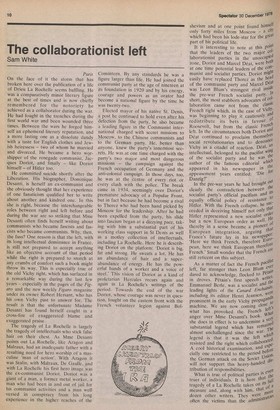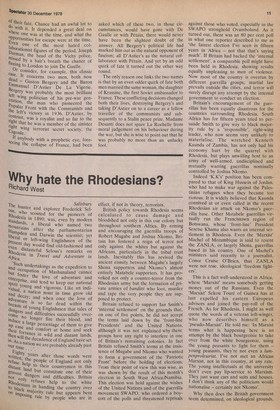The collaborationist left
Sam White
Paris On the face of it the storm that has broken here over the publication of a life of Drieu La Rochelle seems baffling. He was a comparatively minor literary figure at the best of times and is now chiefly remembered for the notoriety he achieved as a collaborator during the war. He had fought in the trenches during the first world war and been wounded three times. Between the wars he forged himself an ephemeral literary reputation, and a more lasting one as a dissolute dandy with a taste for English clothes and Jewish heiressess — two of whom he married and divorced. He became a hero worshipper of the renegade communist, Jacques Doriot, and finally — like Doriot himself — of Hitler too.
He committed suicide shortly after the Liberation. His biographer, Dominique Desanti, is herself an ex-communist and she obviously thought that her experience of one fanaticism qualified her to write about another and kindred one. In this she is right, because the interchangeable roles between right and left before and during the war are so striking that Mme Desanti often finds herself writing about communists who became fascists and fascists who became communists. Why, then, the fuss? One reason is that the left, with its long intellectual dominance in France, is still not prepared to accept anything like an objective account of that period while the right is prepared to snatch at any crumbs of comfort such a book might throw its way. This is especially true of the old Vichy right, which has surfaced in a remarkable way during the last few years — especially in the pages of the Figaro and the new weekly Figaro magazine under its owner Robert Hersant, who has his own Vichy Past to answer for. The result is that the unfortunate Madame Desanti has found herself caught in a cross-fire of exaggerated blame and exaggerated praise.
The tragedy of La Rochelle is largely the tragedy of intellectuals who stick false hair on their chest. As Mme Desanti points out La Rochelle, like Aragon and Malraux, had an inadequate father with a resulting need for hero worship of a masculine 'man of action'. With Aragon it was Stalin, with Malraux, De Gaulle, and with La Rochelle his first hero image was the ex-communist Doriot. Doriot was a giant of a man, a former metal worker, a man who had been in and out of jail for his communist activities and a man well versed in conspiracy from his long experience in the higher reaches of the Comintern. By any standards he was a figure larger than life. He had joined the communist party at the age of nineteen at its foundation in 1920 and by his energy, courage and powers as an orator had become a national figure by the time he was twenty-two.
Elected mayor of his native St. Denis, a post he continued to hold even after his defection from the party, he also became a leading figure in the Communist international charged with secret missions to Moscow, to the Chinese communists and to the German party. He, better than anyone, knew the party's innermost secrets. He was at one time charged with the party's two major and most dangerous missions — the campaign against the French occupation of Germany and the anti-colonial campaign. In those days, too, he was at the centre of every riot or every clash with the police. The break came in 1934, seemingly over Doriot's premature advocacy of a Popular Front, but in fact because he had become a rival to Thorez who had been hand picked by Moscow for the leadership. After he had been expelled from the party, his slide into fascism began at a dizzying pace, taking with him a substantial part of his working class support in St Denis as well as a motley collection of intellectuals, including La Rochelle. Here he is describing Doriot on the platform: Doriot is big, fat and strong. He sweats a lot. He has an abundance of hair and asuperabundance of energy. He has the powerful hands of a worker and a voice of steel.' This vision of Doriot as a kind of proletarian Hercules recurs again and again in La Rochelle's writings of the period. Towards the end of the war Doriot, whose courage was never in question, fought on the eastern front with the French volunteer legion against Bol Spectator 30 December 1978 shevism and at one point found himself only forty miles from Moscow — a it which had been his lode-star for the great of his political life. part It is interesting to note at this poiritt that the leaders of the two major Co; laborationist parties in the unoccupieu zone, Doriot and Marcel Dee, were bow at one time potential leaders of the coin' munist and socialist parties. Doriot tnigh.tt easily have replaced Thorez as the he" of the communist party and Marcel peat was Leon Blum's strongest rival insilie the pre-war French socialist party. 111 short, the most stubborn advocates of collaboration came not from the classic French right which, in the case of Vie04' was beginning to play it cautiously an redistribute its bets in favour Roosevelt, but from the classic Frenen, left. In the circumstances both Doriot an Deal continued to proclaim themselves social revolutionaries and to denounce Vichy as a citadel of reaction. Deal, all intellectual, belonged to the pacifist Wing of the socialist party and he was the author of the famous editorial whthch appeared in his newspaper in tgue, appeasement years entitled: Die In' Danzig?' In the pre-war years he had brought out clearly the contradiction between the socialist party's official pacifism and itS equally official policy of resistanc.e to Hitler. With the French collapse, he Slic; ceeded in deceiving himself not only thtl' Hitler represented a new socialist order but a new European order as well. thereby in a sense became a pioneer European integration, arguing thar. France's future lay in his newsPaPen 'Here we think French, therefore Ent" pean, here we think European therefore French.' Small wonder that the French are still reticent on this subject. As a matter of fact the French Pacifist! left, far stronger than Leon Blum eve.n dared to acknowledge, flocked to Petal, in droves. Petain's first speech writte. .Emmanuel Berle, was a socialist and ti' leading lights of the Canard Enchaine ice' including its editor Henri Jeansen, weda prominent in the early Vichy propagah to machine. We are now coming close %5 what has provoked the French leftat anger over Mme Desanti's book. Shat anger does in effect is to undermine a substantial legend which has reinat,he,, almost unchallenged since the war. 11 legend is that it was the left wine,i, resisted and the right which collabora te' A cool historical examination, and esPiee cially one restricted to the period bef.°0, the German attack on the Soviet 1-hltfia. will not support this heavy-handed u tribution of responsibilities. What is true of political parties ls evtehrie truer of individuals. It is here that No tragedy of a La Rochelle takes on its f 3 measure and, along with him, that ,o,ore dozen other writers. They weretors often the victims than the administra 01 their fate. Chance had an awful lot to do with it. It depended a great deal on Where one was at the time, and what the oPportunities for escape were at the time. Even one of the most hated collaborationist figures of the period, Joseph Darman, the head of the Vichy police, missed by a hair's breath the chance of fleeing to London to join De Gaulle. Or considcr, for example, this classic ease. It concerns two men, both now dead — Gaston Bergery and the Baron Emmanuel D'Astier De La Vigene. pergery was probably the most brilliant left wing politician of his pre-war generation, the man who pioneered the Popular Front with the Communists and the left's victory in 1936. D'Astier,by Contrast, was is royalist and so far to the right that he was a member of the sinister right wing terrorist secret society, the Cagoule.
If anybody with a prophetic eye, foreseeing the collapse of France, had been asked which of these two, in those circumstances, would have gone with De Gaulle or with Petain, there would never have been the slightest doubt of the answer. All Bergery's political life had marked him out as the natural opponent of fascism; all D'Astier's as the natural collaborator with Petain. And yet by an odd quirk of fate it turned out the other way round.
The only-reason one links the two names is that by an even odder quirk of fate both men married the same woman, the daughter of Krassine, the first Soviet ambassador to France. These conflicting decisions changed both their lives, destroying Bergery's and taking D'Astier on to a career as a fellow traveller of the communists and subsequently to a Stalin peace prize. Madame Desanti does not spare La Rochelle from -moral judgement on his behaviour during the war, but she is wise to point out that he was probably no more than an unlucky fool.























































 Previous page
Previous page